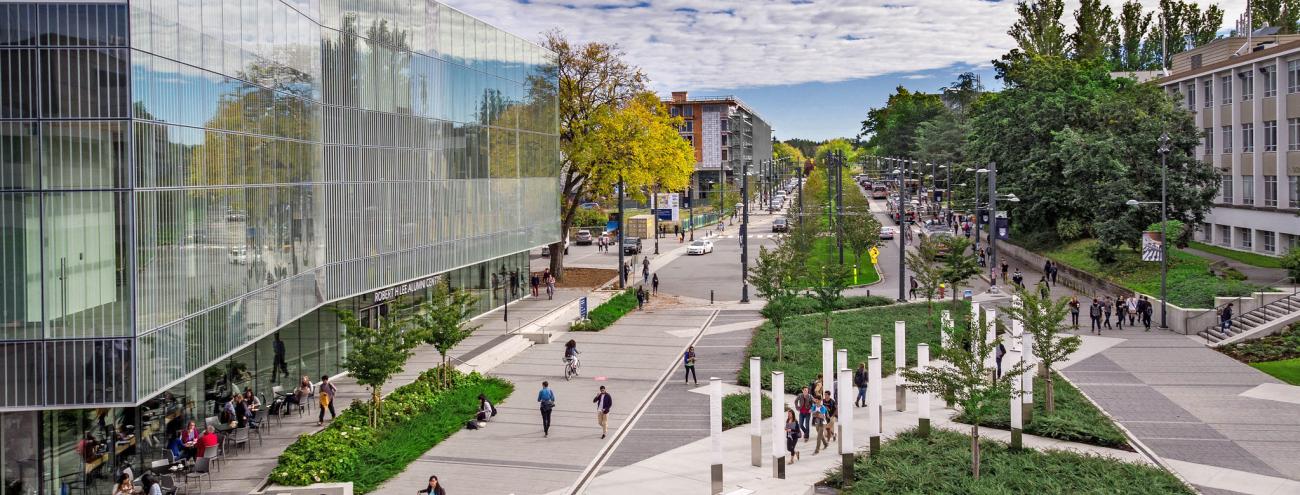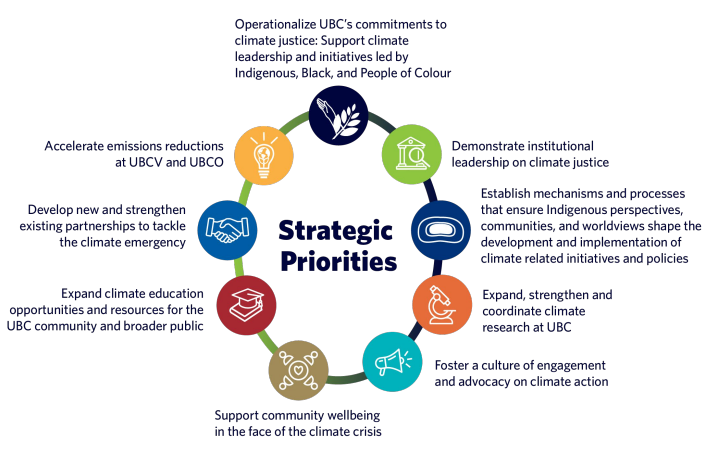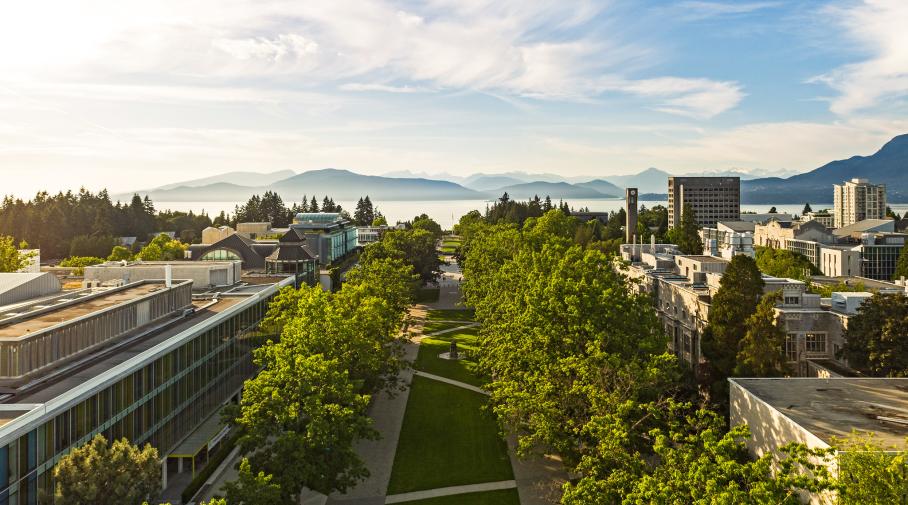CLL Grand Challenge 2023

CLL Grand Challenge 2023
UBC’s Campus as a Living Lab (CLL) is a collaborative framework for researchers, students, staff and external partners to leverage the campus to explore, develop and test new ideas, and to share the knowledge gained from these experiences. CLL projects address urgent global sustainability challenges in our local context, in alignment with UBC's Strategic Plan: Creating vibrant, sustainable environments that enhance wellbeing and excellence for people...at UBC and beyond.
In 2023, UBC Campus as a Living Lab will expand the annual CLL Fund Competition into a one-time, Campus Living Lab Grand Challenge responding to the urgent and critical need to accelerate our collective response to the climate emergency.
The CLL Grand Challenge will provide seed funding totaling:
- $500,000 for projects at the UBC Vancouver Campus, distributed as funding for two (2) projects of $250,000 each
- $100,000 for one project at the UBC Okanagan Campus (UBCO will provide $150,000 through the annual CLL Fund Competition)
The CLL Grand Challenge 2023 is supported by annual Campus Living Lab Funds, and a one-time gift from the UBC Presidential Priority Fund.
Each campus-based competition is open to faculty and staff at the respective campus. All projects must be led by both an academic faculty member and a senior staff member. Projects may be up to 2-years along, starting in March 2024 and ending in March 2026.
Applicants are encouraged to download and review the CLL Grand Challenge Guidelines for more information and details, including eligibility criteria and other project requirements.
key dates
Living Lab Projects
Campus Living Lab projects leverage UBC’s academic and operational capabilities to respond to global problems in our local context. CLL Grand Challenge Projects are co-developed by interdisciplinary academic-operational teams, and must:
- Demonstrate or pilot an innovation. Innovation means a new approach or solution to the challenge, and may be technological, infrastructural, social, organizational or other. Innovation also encompass diverse cultural ways of collaborative learning and knowledge sharing applied in new contexts.
- Advance research and contribute new insight into a body of knowledge, demonstrating excellence in academic research and student learning experiences.
- Improve or benefit the institutional functionality of the university or campus community. These can be campus operations, policy targets, organization or business practices, or other institutional processes.
- Expand impacts beyond UBC through changes to policy or practices. This impact can be through regional project partners, but must also include a broader knowledge exchange and translation pathway. The learnings from the Grand Challenge project are expected to be public, and CLL will support knowledge mobilization activities towards key audiences.
Within the context of the CLL Grand Challenge, projects should also pursue opportunities for:
- Regional partnerships with public, private and community organizations.
- Collaboration and knowledge exchange between faculty and staff counterparts at the Vancouver and Okanagan campuses.
- Leveraging the competition funding, and a growth pathway beyond the funded project scope.
Challenge Theme: Climate Emergency
The climate emergency is a collective “code red for humanity”. Climate impacts are being felt around the world, with increasing frequency and intensity – 2023 has already seen multiple days of record-breaking temperatures and Canada is experiencing one of the worst wildfire seasons ever.
CLL Grand Challenge invites applicants to envision how BC and Canada can respond and adapt to climate emergency and the role that UBC can play in realizing a sustainable future in our communities, cities and regions. While projects should include climate change responses through carbon reduction to directly address the climate emergency, they should also focus on approaches and actions that enable adaptation to future climate conditions.
Projects should explicitly connect with one or more priorities identified by the UBC 2021 Climate Emergency Task Force Report:

Within this climate emergency framing, applicants should develop interdisciplinary living lab project concepts based on their areas of focus and expertise, and aligned with strategic value for UBC and the region. These can include, but are not limited to:
- Climate mitigation and low-carbon alternatives
- Adaptation, resiliency and emergency preparedness
- Biodiversity and enhanced natural systems
- Community health, wellbeing and resiliency
Applicants should connect their project focus to the Climate Emergency priorities, as well as other climate action in UBC Strategic Plan, Campus Action Plans, and the Wellbeing Strategic Framework, and make the case for the potential impacts of the work on and off campus.
Frequently Asked Questions
Eligibility
Project Teams
Yes, faculty and staff members may be part of multiple project teams.
Yes, and we encourage collaborations. However, the proposal should explain how these individuals will be actively involved in the projects based at the applicant's campus.
The Project Manager should be a staff position, separate from either of the Leads, with the qualifications and capability to manage the finances and coordinate activities for the project, and serve as the point of contact for CLL coordination and collaboration. Students may not serve as Project Manager.
Partners may be public, private or community organizations outside of UBC. UBC Faculty members or other departments would be considered part of the project team.
Yes. However, Indigenous collaborations must be grounded in relationships and led by community. Projects that have Indigenous Community Partners must demonstrate an established relationship and community support and involvement in the project through a research permit or other documentation of approval.
It can be either academic or operational, or both. For example, faculty members at UBCV can collaborate with staff leads in their project teams to identify operational connections at UBCO. Additionally, the CLL team and VPRI can assist in this process.
CLL projects do not require to have Indigenous collaboration. However, if projects have Indigenous Community Partners, we want to make sure Indigenous collaborations are grounded in strong relationships and led by community.
Budget and Finances
Matching funding are cash contributions to the project from outside of UBC, such as grants, donations or private funds.
In-kind support is not considered part of the matching funds, unless the support is a donation of something (e.g. expert time, equipment or similar) that the project would be required to purchase to deliver on its goal. In this case, the applicants should provide appropriate proof of both the type of support and equivalent financial value.
No. Applicants are not required to have secured matching funds at the time of application, however, applicants are required to identify potential sources of funding and a plan to pursue them over the course of the project.
See the project guidelines for a list of eligible and ineligible expenses. Generally, CLL funding may be used for student and post-doctoral fellows, contract project staff, honoraria for Indigenous elders, and direct project activity or resource costs, such as equipment, software license or workshops. CLL funding cannot be used to offset regular operating expenses or UBC budgets.
Generally no, project partners should be contributing to the work and benefitting from the project process or outcomes. The exceptions are honoraria for Indigenous Elders and contracted venders doing required portion of the work.
The project is responsible for all operations and maintenance costs associate with a pilot for its full life cycle, including removal of the built components and the returning of the site to the previous conditions at the completion of the projects. This can be through directly paying for eligible costs or making arrangements with the necessary UBC departments or partners.
Yes, CLL funds can be used to support third-party contractual fees for a partial portion of the project work. The specific portion depends on the project's needs and will be reviewed on a case-by-case basis.
The CLL fund can be used to support a portion of the salary for grant-funded staff. UBC budget funded staff can fill various roles in your project, such as the operational lead or project manager. However, the CLL fund does not cover or offset the salary of UBC budget funded staff.
Project Approvals
All projects have different needs, including academic departmental approval, research ethics, facilities approvals and permits and others. Please schedule a meeting with the CLL Management Team to discuss the specifics approvals and permissions for your project.
Applicants are not required to have all the project approvals as part of the application, except for approval from any Indigenous Community Partner. However, applicants should demonstrate a clear understanding of the necessary approval processes, requirements and approving organizations for their project.
Yes, you can make revisions to your application if it is submitted before the deadline. We do not conduct any reviews or assessments before the deadline, so please feel free to edit and resubmit your application using the submission portal. If you'd like to request a preliminary review and feedback from the CLL team before the deadline, please contact us at CLL.Team@ubc.ca.

